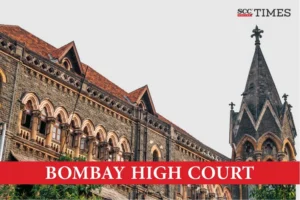Bombay High Court: The Division Bench of Revati Mohite Dere* and Dr. Neela Gokhale, JJ., heard a writ petition preferred under Article 226 of the Constitution and under Section 482 of the Criminal Procedure Code, 1973 that sought the quashing of the FIR for the alleged offences punishable under Sections 306, 506(2) and 34 of the Penal Code, 1860 (‘IPC’). The petitioner was accused of instigating the suicide of the deceased for harassment over a loan given by him to the deceased. The Court held that it was not possible from any angle to conclude that the petitioner instigated the deceased to commit suicide by demanding the payment of the amount borrowed by him or that the petitioner used abusive language or intimidated him.
Background:
The petitioner was a businessman manufacturing electrical control panels and the deceased ran a business of household articles. The petitioner had good relations with the deceased’s family and had even advanced loans to the deceased and his son through loan agreements. On 27-10-2015, the petitioner’s wife advanced a sum of Rs. 25 lakhs to the deceased without a written agreement which was later made part of the agreement dated 17-3-2017. The deceased committed suicide on 24-7-2017 and in his statement on the same day, his son did not disclose any suspicion on anyone.
On 1-9-2017, the deceased’s family changed their residence. The wife found a suicide note on 10-12-2017 while unpacking and thereafter lodged an FIR on 22-12-2017 against the persons mentioned in that note. From the note, it appeared that the deceased started writing it on 20-7-2017 which continued till 23-7-2017 wherein he made allegations against 9 persons including the petitioner. He wrote that the named people had taken money from him and cheated and threatened him over the same and specifically called out the petitioner of being very harsh in collecting his interest money.
The prosecution along with the suicide note, relied on the statement of the deceased’s employee, recorded on 28-1-2018, who said that the deceased had borrowed a huge sum of money on interest from the petitioner and had repeatedly requested the petitioner to reduce the interest rate. He further stated that the petitioner along with few others, mentally tortured the deceased. But it was contended by the petitioner that the only evidence against the petitioner was the suicide note and the statement of the deceased’s employee, did not even remotely make out a case under any of the provisions and sought the FIR to be quashed.
Analysis:
The Court said that the question to be considered was whether an offence under Sections 306 and 506(2) IPC, was made out, qua the petitioner, keeping in mind the evidence sought to be relied upon by the prosecution, to which the Court answered that taking the prosecution case as it stands, no offence as alleged was disclosed qua the petitioner. The Court further stated that the petitioner who had given loan to the deceased by executing a loan agreement had, in no way the requisite mens rea to instigate the deceased to commit suicide.
The Court opined that for an act of instigation to constitute an offence under Section 306 IPC, it was required to be of such an intensity, as to push the deceased to such perplexity under which he had no choice, but to commit suicide. Such instigation must also be in close proximity to the act and time of suicide, but both these factors were absent in this case.
The Court referred to Mahendra Awase v. State of M.P., 2025 SCC Online SC 107, wherein the Supreme Court held that “the person who is said to have abetted the commission of suicide must have played an active role by an act of instigation or by doing certain act to facilitate the commission of suicide”. Thus, this Court observed that a mere allegation or accusation of harassment made by the deceased prior to his death, could not be treated as the fulcrum of an offence under Section 306 IPC.
The Court highlighted that the ingredients of Section 107 were sine qua non for constituting an offence under Section 306 IPC and that instigation or incitement on the part of the accused person was the gravamen of the offence of abetment to suicide. It was not possible from any angle to conclude that the petitioner instigated the deceased to commit suicide by demanding the payment of the amount borrowed by him or that the petitioner used abusive language or intimidated him. The Court also observed that the statement of the deceased’s employee nowhere revealed that the petitioner had come to the shop to demand money. Nor did the suicide note reveal any proximity between the petitioner’s act and the deceased committing suicide.
Therefore, after the above considerations, the Court quashed and set aside the FIR as well as the charge-sheet filed against the petitioner and accordingly disposed of the petition.
[Nishit Patel v. State of Maharashtra, 2025 SCC OnLine Bom 2397, decided on 18-6-2025]
*Judgment authored by: Justice Revati Mohite Dere
Advocates who appeared in this case :
For the Petitioner: Rahul Moghe a/w Kalyani Rathod.
For the Respondents: S. S. Kaushik APP for the Respondent 1-State; Rakesh Kumar Singh, for the Respondent 2.


